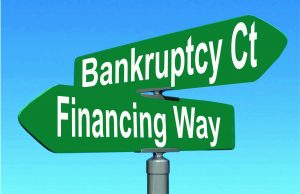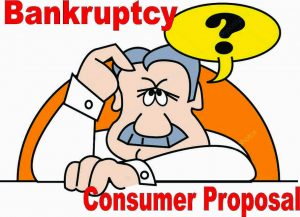 The following information comes courtesy of Dan White, President, Tax Audit Solutions. This company has decades of experience in all areas of tax problems. They are Tax Representatives. Solving Tax Problems is their main focus. If you are in trouble trying to resolve a big tax debt problem with CRA, Tax Audit Solutions can help. Contact Dan at 905-728-2100 Extension 203 or dan.white@taxauditsolutions.com
The following information comes courtesy of Dan White, President, Tax Audit Solutions. This company has decades of experience in all areas of tax problems. They are Tax Representatives. Solving Tax Problems is their main focus. If you are in trouble trying to resolve a big tax debt problem with CRA, Tax Audit Solutions can help. Contact Dan at 905-728-2100 Extension 203 or dan.white@taxauditsolutions.com
 Borrowing to alleviate financial difficulties:
Borrowing to alleviate financial difficulties:
Insolvency – Bankruptcy or Consumer Proposal:
 Even in Bankruptcy, you don’t want to experience CRA coming back at you after your discharge, which they can and occasionally do come back at you. You need to make sure you have good advice before making any final decisions.
Even in Bankruptcy, you don’t want to experience CRA coming back at you after your discharge, which they can and occasionally do come back at you. You need to make sure you have good advice before making any final decisions.The Downside:
First, the Office of the Superintendent of Bankruptcy will send information to the credit bureau notifying them that you filed a consumer proposal. A note will appear in the legal or public records section of your credit report identifying the type of proceeding (in this case a consumer proposal) and the date you filed. When you complete your proposal, this information is updated with the completion date. We explain below how long this notice will remain on your report.
Second, each individual creditor will report that the account was ‘included in a proposal’. The debt will be coded as an R7 which means you have entered into an arrangement to settle your debts with your creditors. A perfect credit rating is an R1, and bankruptcy is an R9, so a proposal is sometimes viewed as slightly better than a bankruptcy. Account information is generally purged from your credit report six years after the last activity date. That may be the last date of payment or the date of filing, depending on the creditor. Occasionally, creditors will incorrectly report your account as ‘included in a bankruptcy’. The proper legal proceeding will appear in the public records or legal section.
How long will a consumer proposal notice remain on my credit report?
Both TransUnion and Equifax have updated their retention policy regarding consumer proposals. Below is the most current data, as of 2019, from their websites:
TransUnion reports that:
The consumer proposal and all accounts reported as satisfied through the proposal will be removed from your file three (3) years from the date you satisfied the proposal or six (6) years after the date you defaulted on the account, whichever date comes first.
For more information on how long TransUnion keeps information on file see here.
Equifax states that:
A consumer proposal will be removed from your Equifax credit report 3 years after you’ve paid off all the debts according to the proposal, or 6 years from the date it was filed, whichever comes first.
More information about retention periods for Equifax can be found here.
What does this mean?
The longest a consumer proposal will now remain on your credit report is 6 years from the date you file based on these new guidelines.
If you complete your consumer proposal payments in five years, the notice will be removed one year later (that is, six years from the date you filed).
If you complete your payments in two years, the notice will be removed five years from the date you filed.
If you complete a lump sum proposal, the notice will be removed in roughly three years (you will need to attend two counselling sessions to receive your certificate of completion).
How long will a consumer proposal remain on my credit report? New Rules!
The more important question may not be what is your credit rating after your consumer proposal but rather how is your financial condition today? If you are missing payments or do not have access to further credit due to carrying too much debt, then the sooner your deal with that debt, the sooner you can begin the debt recovery process.
Rebuilding Your Credit After a Proposal:
Your proposal is how you eliminate your debt so you can begin the process of building a new, and better, credit history. Improving your credit score after a consumer proposal involves:
- Monitoring your credit report for errors and omissions and sending the necessary documentation to the credit bureau to have any mistakes corrected
- Consider applying for a secured credit card to re-establish a pattern of repayment.
- Keeping all bill payments current.
- It is strongly recommend that you pay all credit card balances in full each month.
Mortgages after proposal:
If you have an existing mortgage, your lender will generally renew your mortgage even during your proposal as long as you have kept current on your mortgage payments.
Rebuilding your credit for a mortgage, if that is your goal, usually requires something called the two plus two plus two rule. While this is an unofficial rule, generally you will need:
- two credit facilities (any combination of credit cards, car loan or other loan)
- if a credit card, it should have a $2,000 credit limit
- you will need to demonstrate two years of good payment history.
- Please keep in mind, you only need this level of credit if you are looking for a mortgage or other large loan.
- Otherwise, keep your credit card limits well within your ability to pay off each month.
Do not hesitate to contact me if I can be of assistance:
Terry Lynch 416-315-1787
terrylynch@rogers.com

Great Job Terry. And your timing is perfect.